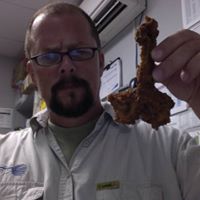Leaderboard
Popular Content
Showing content with the highest reputation on 11/28/2011 in all areas
-
So what you're saying is that sometimes the experts disagree, so we should be skeptical of all opinions, even those considered "expert opinions", and we should all develop an ability to independently and critically appraise the literature? You're suggesting that expert opinion is only slightly more valuable than the personal anecdote of non-experts? I agree. Welcome to a basic cornerstone of science - rational skepticism. You'll also notice that this is why even published and peer reviewed case reports and case series are generally regarded as better quality data than expert opinion. This is also part of the foundations of evidence-based medicine. However, if you're suggesting some sort of radical scientific relativism, for example, that because one can find the odd researcher who opposes climate change, versus the overwhelming majority that do, that each opinion is equally valid, or that your uneducated opinion should be considered to be as valid, then you're straying dangerously into UFO-abduction land. Just because there is disagreement about an issue doesn't mean that both sides of the argument are equally valid, or supported by the available data. As to when scientists believe "life begins", I'm not sure that this is a scientific question, but is probably a religious and /or legal / ethical one. A sperm cell is as alive as a cardiomyocyte, algae, plankton, or a pneumococcus. When people talk about "life beginning", they're usually about to discuss reproductive medicine. Drilling for oil is dangerous. So is breathing. When we start asking the question "What is the acceptable risk for drilling for oil?" we're asking a moral question. One for the polticians. When we ask "Do our current drilling practices exceed a previously determined level of acceptable risk", then we starting to ask a question that can lead to hypothesis generation and application of the scientific method. Are you sure? Go to: http://www.pubmed.com/ Then the question becomes, how do we evaluate the available data? Is defining the argument in terms of the number of articles available the best way to form our question? Or should we try and evaluate the quality of the research performed in each individual article and compare them against each other. If only someone had developed a systematic method for reviewing all the available data, and comparing it to each other. If only there was some sort of consortium that regularly published meta-analyses of the available data... Oh. Wait. It's here: http://www.thecochra...le/CD000560.pdf Cochrane reviews. They're new They've been around forever since 1993, but they're good. Plain language summary (for those of us with common sense, who don't want to read the sciencey bits because they're beneath us.): P L A I N L A N G U A G E S U M M A R Y Psychological debriefing for preventing post traumatic stress disorder (PTSD) This review concerns the efficacy of single session psychological “debriefing” in reducing psychological distress and preventing the development of post traumatic stress disorder (PTSD) after traumatic events. Psychological debriefing is either equivalent to, or worse than, control or educational interventions in preventing or reducing the severity of PTSD, depression, anxiety and general psychological morbidity. There is some suggestion that it may increase the risk of PTSD and depression. The routine use of single session debriefing given to non selected trauma victims is not supported. No evidence has been found that this procedure is effective. Let's see: * You're not educated in the subject area, ergo, you probably don't know what you're talking about. Why should we value your personal uneducated opinion over the opinion of a psychologist or psychiatrist? Or Bledsoe, for that matter. * The academic's theories are formulated based upon the results of peer-reviewed, published data. They are empirical in nature, and they talk not solely to their personal experience, but to the experience of thousands of research participants. They are subject to review in the presence of new data, and are routinely presented and defended at international conferences. I'm not saying that there's not an element of chance here, that you could be right. I'm just saying that you haven't provided any basis for us to believe that your personal opinion is scientific. Future research might support your position (whatever it actually is). But that still doesn't mean that any of us should necessarily value your opinion as highly as the opinion of an expert. And it certainly doesn't mean that instead of interpreting the available peer-reviewed research, we should all just get on the phone and give you a call to tell us the answer! Otherwise that science thing would be so much easier. For example, instead of spending all that money at CERN, we could just ask you, hey, what's going on with those neutrinos? http://www.bbc.co.uk...onment-158308442 points
-
Getting into some philosophical stuff here - I`m loving it! In my way of thinking - no. I think you gotta differentiate between two sphere`s here. The first, would be the one where you define an item/object/being for it`s use. The second would be to put your findings into the context for the person. So, following that strain of thought, there`d be a difference between Fiona the cat, which is dearly loved by her owner, and Hachiko (name just got into my brain - you gotta watch the movie, which has the same name!) the service animal. While there`s "only" an emotional bond with the first animal, the second is compensating for a physical deficit of it`s owner. The best example would be a seeing-eye-dog. Now, I guess, in the mind of it`s owner, Hachiko would be "linked" to his ability to compensate for his loss of the sense (seeing). So, if you`d take away the dog, it would be like taking away his ability to "see" the outside world (`cause his doing that through his dog in a crude way). So, even if the doggies service isn`t really needed, `cause the pat. is in a safe enviroment, I think he would experience the parting of the animal as a loss of his sense. Example: You`re living on an island - which you don`t need to leave, though it`s reassuring to know there`s a bridge to the mainland if you ever feel the need to get out of there. Even if you don`t need to leave the island, wouldn`t it be bad to know that the bridge got burned down (assuming it`s a wooden bridge). To clarify - I`m only going into the extent of the emotional part, of course, this is no argumentation for any legal responsibility and it`s just guesswork/my thoughts,1 point
-
1 point
-
I think that most of us are blessed with that option. And it's a great first option. But we're not talking about first options here, we're talking about CISD, a whole different scenario. This statement makes it clear that either you have no actual involvement with professional religious counseling, or that the experiences you have had have been from backwoods, knuckle draggers..You are mistaken if you try and paint the entire religious world with that brush. Truthfully I do. I have resolved many problems with the help of my friends here, often specifically with ak, but he would be the first to say, "Bro, you are dealing with this in an unhealthy way. I don't think chatting about it is going to get it done. It's time we stepped this over to the pro's." And I would believe him, and do so. Buddies are great. I have discussed many heart wrenching issues with my friends here, and have made significant changes in perspective and attitude based on their council, but not a single one of the people that I respect here would ever consider my advice to be on a professional level, regardless of what I may have seen or done. Nor would a single person here ever again trust me if I told them, "I know you feel like you need more help, but don't worry, you and I can work this out..." As it would make it obvious that I was so ignorant as to be unable to see my own bullshit. CISD counselors are not professionals. They have been given enough information to harm people, and they sometimes do. Do people often feel better after having gone to them? Sure...that's because they weren't really that fucked up to begin with. You seem to be confusing visiting with a buddy to seeking educated, professional help. Both are great. The problem arises when someone gives your buddy a cert that can convince you and others that he IS the professional. Things can go sideways, people become or remain in pain, and there are no winners but the CISD guy that gets to play doctor because he spent a few hours in class. HLPP, C'mon, and I truly mean this respectfully, you are too smart to make the argument that "It's always been done this way, and it makes me feel important, so it must be good." Do me this favor, just this once. Look at the presentation, look at the studies, at least the overviews, and see if you have the same opinion once you've become educated on the subject as you do now. I'm truly curious of your opinion after you've done so... Dwayne1 point
-
How do you know it has never happened if you never do a pat down? Your logic is illogical.1 point
-
Actually, I frequently tell patients to not take stuff to the hospital that they initially might consider bringing: jewelry, wheelchairs, walkers, suitcases full of clothes, as these things are not needed. With that being said, I would take the dog. But to play devils advocate to your statement vorenus, hospitals typically do not allow children to stay with the patient during their stay, and may not allow family visitation under certain circumstances. Wouldn't your family be "needed" more than a dog ? Say you are a first time mom, and you got MRSA in your c-section wound, and now you can not hold or breastfeed your baby, would that not be traumatic emotionally ?1 point
-
It`s not really about the whole - "I know what you`re going through, I`ve been there, too, therefore I have THE right answer". Point is, everyone is reacting differently about the same situations. I may be totally cool in a situation, where you`re moved to the core and vice versa. The difference Dwayne is meaning (I guess) is the one between someone scholared in the main principles of counselling and deeper psychiatry, and someone who`s not (regardless wether that person`s a preacher or not).1 point
-
I believe it is like everything else in medicine, we know enough to be dangerous, and can help each other as long as we do not go too far past our limits. You start IVs every day, and cannulating an artery is not impossible for us, but should not be done. We counsel patients and our coworkers everyday (mentally/emotionally), and as long as we keep it at our level that is fine, but we start pretending to be psychiatrists we have gone too far. I always provide a shoulder to cry on and an ear that listens, but I also know when it is time for me to back out and let the professionals do what they do best. How many times have you had a partner who had all kinds of jerry springer moments in his home life, so you counseled him on what you knew from your life experience. Nothing wrong with that, but if he is depressed or suicidal, you send them to the professional.1 point
-
I will throw a different tactic at you. This guy's behavior has been accepted by everyone else, you seem to be the lone voice against. Being confrontational or immediately going to the supervisor will probably not make you very popular. How about this, why don't you find something that you like to do frequently, that requires him to miss some of his family and/or meal time. Tell him you have a cousin that plays in the league his kids do not, and you want to go see his games, go visit a family member or girlfriend, decide you want to take music lessons while on-duty. He may not realize how rude he is being, since this is the way he has always done it, let him walk a mile in your shoes and see how he likes it. I agree with crap, gay porn on the TV seems to chase everyone out of the room.1 point
-
And that professional counselor knows what it's like to smell burned flesh and to be exposed to the most raw edges of humanity in the same way that EMS does? Most good pastors don't even bring up God at first when people come to them hurting... they listen and provide validation, and then suggest coping mechanisms. Not too much different from professional psychologist, IMHO. Just saying. Wendy CO EMT-B1 point
-
Risk is, that if this is an all-around accepted behaviour at the station, you might get on the wrong side of the bunch and will lose sympathy points. If that matters to you, you`ll either have to take it or leave. If it doesn`t - tell him to step the fuck down and deal with his family matters at his freaking home or at his time off.1 point
-
Why do you feel guilty? We often allow people to treat us badly. Is hanging out with some other dude's family at the ice rink in your job description? If it is, sorry for you. Otherwise, you are under no obligation to do this. While its hard, you are going to have to stop being a piece of carpet, learn to assert yourself and set boundaries. You may ruffle some feathers, but few if any people get through life without rubbing people the wrong way from time to time.1 point
-
Note to self: Do NOT debate with systemet1 point
-
1 point
-
I will take it as a joke...but a very unprofessional one at that.......... as a "manager" (what you profess, but still have yet to show) you should realise that statements like this only denegrates women in EMS. If you are happy to place a "boobs" out pic for your avatar and then even joke about using clevage as a way to do things just show how out of touch you are. To even joke like that on a public forum is inaapropriate and so easily offensive to others. some how i fail to see how you have any role in a mangerial capacity. and if you do then it speaks so well of the company that employs you. So you see that it is fime to make sexist and degrading jokes on this site but then find it inappropriate to transport a seeing eye dog, wont have a firearm in your ambulance (not a BUS, I hate that term) for ANY reason, but then feel it is ok to transport a mobidly obese patient unrestrained. just wondering as to where you got your management qualifications... I know if i said and did the things you state that my time as a manager would be very short.......and the 120 officers that are under my care would not have ANY confidence in me.1 point
-
I am finding it difficult to believe that you are a Manager of anything except maybe a topless bar. I am hopeful that the company that you "manage" for does not have the ability to view your posts here, or your "name"..or your cleavaged picture. Not much of a picture of professionalism IMHO. And what kind of manager doesn't give positive feedback when it IS possible to make substantial changes if the proper muscles are worked? WOW... To the OP, don't give up based on the advice or comments of Miss Pee Pee....If this is a job you really want, work towards it. Best of Luck! AC1 point
-
Well ya got the dog talk down pat, bet you know cow also, now how about learn human. As per protocol in any service if you clean your ambulance to the proper standard there should be no problem with Dog dander.1 point
-
How can you be in a field which requires you to constantly adapt to a situation and deal in such absolutes.... are you really just that textbook and set in your "ways" that you can not adapt to a situation??? You rarely provide anything of substance to a conversation except your statement of "fact" and expect everyone else to just take that as being right? NFW in my book. You can safely secure a weapon in an ambulance. It has been done quite often, there are many of us here who are well versed in numerous types of weapons and weapon systems. You would be hard pressed to present me with a gun that is available to civilians that I could not disarm safely... We're not all blithering idiots1 point
-
Service animals are NOT pets., The following information is from one agency that trains service dogs, "Paws with a Cause". They are a non-profit, and, admittedly, what follows is part of their fund raising ad campaign, from their web site: Types of Paws With A Cause Assistance Dogs As a national non-profit organization, PAWS relies heavily upon the generosity of donors who support the work we do for people with disabilities. Our clients pay no fee to apply for or to receive their Assistance Dog from PAWS. The sponsorship to train and place a PAWS Assistance Dogs is $30,000. PAWS allows and encourages clients to participate in <a href="http://www.pawswithacause.org/Clients/AssistanceDogs/tabid/700/Default.aspx#" id="_GPLITA_2" in_rurl="http://www.textsrv.com/click?v=VVM6MTI0Mjg6ODM3OmZ1bmQgcmFpc2luZzpmOGM5Y2ZkMGVjMTZjYzk4OTAxOTA2MGJhOWM0ZTNmZTp6LTEwNDItMTI4ODc6d3d3LnBhd3N3aXRoYWNhdXNlLm9yZw%3D%3D" style="text-decoration: underline" title="Powered by Text-Enhance">fund raising activities. Our most successful clients are those who played an active role in their fund raising and placement process in their quest for independence. Please note: It is PAWS policy not to place an Assistance Dog in a home with another dog under the age of 10 years. It has been our experience that a young dog in the home can interfere with the bonding and training process of the Assistance Dog team. Hearing Dogs Hearing Dogs learn to alert individuals who are deaf or hard of hearing to basic sounds such as a smoke alarm, a ringing telephone, a crying baby or a doorbell. The dog is trained to alert the individual of a sound and then lead them to the sound. If the sound being alerted to is a smoke alarm, the dog then accompanies the owner out of the building. All PAWS Hearing Dogs are taught basic American Sign Language commands. Hearing Dog training takes approximately 4 - 6 months at the PAWS National Headquarters and Training Center. PAWS training Hearing Dogs for individuals 18 years of age and older. If you would like to receive more information about applying for a PAWS Hearing Dog, please contact us. Service Dogs Service Dogs are custom-trained to assist people with physical disabilities or seizure disorders. Service Dogs can perform tasks such as opening doors, turning light switches on/off, or picking up an object as small as a dime. Should the client fall, the dog can even be trained to act as a brace so the person can regain position. Service Dog training takes approximately 6 - 9 months at the PAWS National Headquarters and Training Center. PAWS trains Service Dogs for those14 years of age and older. If you would like to receive more information about applying for a PAWS Service Dog, please contact us. Seizure Response Dogs PAWS is the nation's largest provider of Service Dogs trained to deal with seizure disorders. A dog can be trained to (among other things) push life-alert buttons, help and/or comfort a person during a seizure and get help or retrieve the phone for the client. Although we do not profess to train dogs to detect seizures, several of our Seizure Dogs have, after several years with a client, developed the ability to alert their owner of an oncoming seizure. Seizure Response Dog training takes approximately 6 - 9 months at the PAWS National Headquarters and Training Center. PAWS trains Seizure Response Dogs for individuals 14 years of age and older. If you would like to receive more information about applying for a PAWS Seizure Response Dog, please contact us. Service Dogs for Children with Autism In June of 2009, PAWS began a two-year pilot program for families living with Autism. The Service Dogs for Children with Autism program at PAWS places highly-skilled Service Dogs with children with Autism. The program's goals include having the dog help with social interactions and relationships; help with verbal and nonverbal communications; help increase a child's interest in activities or play; and help decrease overall stress within the family and home life. To children with Autism, everyone, everywhere and everything is 'outside' of their world. Dogs can break into this world by always being there when they are needed by the child; dogs don't pass judgment on a child, like humans tend to do. By nature, the dog does not care that the child has Autism; they only care that they are a part of the child's life. The Service Dog can facilitate hand/eye coordination. Socially interacting with their Service Dog allows for the children to have a friend - this often eludes children with Autism, as they typically lack the necessary social skills to participate in group activities or social outings. The Service Dog can be vital in teaching the child life skills. The child learns to comb and brush the hair on the dog and they, in turn, learn to do it for themselves. The same things can be done with brushing their teeth, bathing and getting dressed. Children who have been diagnosed with an Autism Spectrum disorder can qualify for the PAWS Service Dogs for Children with Autism program under the following criteria: 4 - 12 years of age (applications accepted for 4 - 10 year olds) in an ongoing education program in a physical therapy, speech therapy, occupational therapy or recreational therapy program have excellent family support If you would like to receive more information about applying for a PAWS Service Dog for Children with Autism, please contact us. If you or your child are much younger than the above minimum ages, we recommend that you visit the website of Assistance Dogs International (www.assistancedogsinternational.org) for a listing of member programs, some of which train for younger children. (From their fundraiser mailing...) Each dog ... is a true working professional, having mastered an intensive, six month training regimen, following a year of"basic training" provided by one of our volunteer puppy raisers. Here's how it works: Phase one includes a minimum of 12 sessions in public places, during which 28 commands must be mastered. We even administer a temperament test to ensure that dogs and clients are well matched. Phase two trains each dog to respond to commands to retrieve 20 diferent items, ranging in size from a dime to a 5 pound hammer. A perfect score, with no dropped items, is required. Phase three develops each dog's skills to deal with people's specific disabilities, like epilepsy, spinal cord injury, and cerebral palsy. As you can see, we invest a tremendous amount of time amd effort in a dog before it begins working as an Assistance Dog. Richard B, again. On securing a Service animal, they usually are in some kind of harness, through which a seat belt can be looped, so they don't become a living projectile in the event of a panic stop or ambulance accident. If you are afraid of dogs, or have an allergy, if you're in with the patient, swap out with your driving partner. If the dog rides in the cab, then you become the patient's care-giver. Let them sort out at the hospital who's going to claim the animal if the patient is going to be admitted, as I'm not going to delay patient care and transport if I can help it. If the LEOs are on the scene, turn the animal over to them to transport to the same ER you're headed to, and again, sort it out at the hospital.1 point
-
Keep in place if safe... allow hospital security to take the gun and secure it. Every ER has a place with gun safes... at least where I work, we are trained on clearing firearms and safely securing them for the patients duration of stay. If you have to remove it...I agree with Wendy... remove the entire holster with the gun inside.... the gun is safest in the holster and then I would secure it in a lockable area of the ambulance with padding to secure it in the event of a collision. We don't need any crazy old gun going off... We come across this a lot in Colorado, hence why I initiated the aforementioned thread .1 point
-
Are you freakin' kidding me? Your anecdotal observations and half baked theories are grounded in speculation and limited by the information in your own mind. Go and read the presentation and realize that if you persist in your opinion, you are bucking not only science but people who understand it and know it a lot better than you. Everybody is entitled to an opinion, but there are informed and educated ones and there are ignorant knee jerk ones. Don't persist in wrongheadedness on this one. It will destroy the credibility you have left.1 point
-
This is not a black and white case, this is one of the many grays we all will encounter at one time or another. If put in this situation, I would NOT hand over the weapon to anyone on scene. I would elect to begin transport as this patient at that moment has a higher/the highest probability of ROSC. I would confirm/visualize the presence of the weapon and how it is positioned (if I do not want to handle it). Regardless of being familiar with a weapon or not, I would remove it without pulling the trigger as even a 3 year old knows what makes a gun go bang. The weapon could be placed/secured in an exterior compartment but I myself would prefer placing it where I have eyes on it. The presence of this weapon would not delay delivery of care or transport. Upon arrival at the ER, I would notify LE or Hospital security to come secure the weapon. This would not be a new request to either choice and they are quite familiar how to proceed from there. I could fully justify my exception for allowing the weapon in the ambulance to anyone who challenges the decision.1 point
-
I would attempt to continue vomiting until I was volume depleted, then that should fix the hypertension.1 point
-
This is PA's protocol, as I could not find the term service dog or service animal in MD's protocols. Purpose: The purpose of this policy is to provide guidance to EMS providers who encounter individuals who are assisted by service animals, including guide dogs for the visually impaired and other types of service animals. However, because of the nature of the services we provide it can sometimes be difficult to accommodate a patient and a service animal in an ambulance. EMS providers should be guided by this policy in determining whether service animals should be transported with the individual in the ambulance or wheelchair van, or whether alternate methods of transporting the service animal should be utilized. Criteria: A. Any call involving a patient with service animals. Exclusion Criteria: A. None. Procedure A. All Patients with Service Animals: 1. Service animals, for example, guide dogs utilized by visually impaired persons, shall be permitted to accompany the patient in the ambulance or wheelchair van unless the presence of the service animal will disrupt emergency or urgent patient care or there is some basis for the crew members to believe that the safety of the crew, the patient or others would be compromised by the presence of the service animal in the ambulance or wheelchair van 2. EMS providers should assess the level of care required to provide competent medical attention to the patient. 3. When the presence of a service animal in the ambulance might interfere with patient care, jeopardize the safety of the crew, the patient or others, or cause damage to the ambulance or equipment, providers should make other arrangements for simultaneous transport of the service animal to the receiving facility. Unless emergency conditions dictate otherwise, absolutely every effort must be made to reunite the patient with the service animal at the time of the patient’s arrival at the hospital or other destination. 4. Acceptable alternative methods of transporting a service animal to the receiving facility include, but are not necessarily limited to, family members, friends or neighbors of the patient, or a law enforcement official. Attempt to obtain and document the consent of the patient for transport of the service animal by such person. If no such individuals are available, contact the agency base or PSAP and request that additional manpower respond to transport the service animal. 5. Providers should document on the patient care report instances where the patient utilizes a service animal, and should document on the patient care report whether or not the service animal was transported with the patient. If the service animal is not transported with the patient, a separate incident report should be maintained by the EMS agency describing the reasons that the service animal was not transported with the patient. Notes: 1. EMS agencies in PA provide quality services to all individuals regardless of race, color, national origin, sex, disability, or creed, and comply with all applicable state and Federal laws regarding discrimination and access to public accommodations.1 point
-
Before we get into the habit of feeding you answers that you should be looking up yourself, why don't you tell us what you think should be done? Don't know? Go look it up. It'll be good prep for you as a "soon to be EMS student".1 point
-
Okay so really surpised at the names Lardo and Tubbo comming out of this group We know that obesity is a growing issue in our society but there are those that are truely obese from medical reasons and how do we know he is not one of them? As for the Airline they probably didnt know he was 400 lbs when he bought the ticket but it should have been addressed when he checked in and then charged for the extra seat. Since this plane was already full and he as the late boarder they should have turned him away for that flight and rescheduled him on the next with 2 available seats. Pretty simple if you ask me. If that was me I would have put up a polite stink before take off and the airline since they made his flight horrid should be offering a hole lot more than a 200 doller voucher.1 point
-
Don't worry, I don't tend to take things personally. There's going to be strong opinions on a forum like this. I have my own. Disagreeing with me does not make me angry, as I may disagree with you with no intent to anger you. Like now. As far as my education goes, I had a great teacher working within a poor program design. Only those of us that were highly motivated made it through. I used every study aid I could get my hands on. If you poo poo acronyms like LMNO to make them Pee, you might as well do away with SAMPLE, OPQRST, DCAP-BTLS and all the others. You're implying that learning these makes people too lazy to learn why they're asking the questions or performing said assessments. I understand where you're coming from, I just disagree. Sent from my iPhone using Tapatalk1 point
-
Then what would you say about people who go to their religous leader for advice, as I imagine far more people see their pastor before they see a psychiatrists. These religous leaders are not mental health "PROFESSIONALS", but they counsel far more than the mental health community.0 points
-
I agree with having the dog transported by animal control or PD, you do not know how the dog will react to strangers, many patients have allergies to dog hair and dandruff, and he is not walking anywhere soon. He does not need his dog while in the hospital. Where is the hospital going to store his dog during treatment ?-1 points
-
Asysin, you need to go back and read the thread. I was the one who WOULD transport the obese patient, it was the rest of the room who disagreed. There is no way to know how a dog will react when scared. Yes these dogs are trained (I assume) but how many times have you been on calls where dogs attack their owners ? The patient does not need the dog while in the ER.-1 points
-
I wonder how so many "experts" end up accidentally shooting themselves, family members and friends when they have handled their gun many times. Should I allow someones illegal cocaine in my bus as well because it is their property, how about their kiddie porn videos ? I would give the gun to someone and have them sign for it, not putting it in my ambulance, if it gets lost so be it. If you are dispatched to person down with gun in hand, are you going in or staging for PD ? If it is unsafe enough to keep you off-scene it is not safe in your ambulance.-2 points
-
-2 points
-
And do you honestly believe that there is anything she can do in the next few weeks to be able to double her arm strength, it is time for another job, it is obvious this one wants penises only.-2 points














